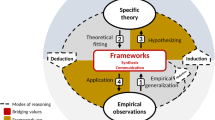Abstract
The sociological perspectives of Max Weber and the “Frankfurt School” have been viewed as polarities in much of the recent literature. The Frankfurt sociologists were advocates of a neo-Marxism that stressed dialectical reasoning and rejected the notion of value-neutrality. Weber adhered to the canons of causal logic and cultivated the ideal of objectivity in social research. Notwithstanding these theoretical and methodological differences, Weber and the advocates of critical theory arrived at surprisingly similar conclusions about the “fate” of the modern world. Weber saw the advent of a bureaucratic “iron cage” which would effectively negate the role of the individual, while the Frankfurt sociologists posited the onset of an “administered world” in which human activity would be smothered in an ever-expanding network of management and control. Given these commonalities, a revision of the standard evaluation of Weber and critical theory is suggested.
Similar content being viewed by others
References
Adorno, Theodor W. 1965 “Rede being offiziellen Emfang...” in Otto Stammer (ed.), Max Weber und die Soziologie Heute. Tubingen: J.C.B. Mohr.
—— 1967 Prisms. Samuel and Shierry Weber (trs.). London: Neville Spearman.
—— 1974 “The stars down to earth.” Telos 40:83.
Baum, Gregory 1970 “Does the world remain disenchanted?” Social Research 37: 153–202.
Buck-Morss, Susan 1977 The Origins of Negative Dialect. New York: The Free Press.
Burroughs, William 1966 Naked Lunch. New York: Grove Press.
Der Spiegel 1968 “Gësprach mit Theodor W. Adorno.” (February 26):116–124.
Douglas, Jack 1971 American Social Order. New York: The Free press.
Frankfurt Institute for Social Research 1972 Aspects of Sociology—Frankfurt Institute for Social Research. John Viertel (trs.). Boston: Beacon Press.
Gerth, Hans and C. Wright Mills 1958 From Max Weber. New York: Oxford University Press.
Greisman, H.C. 1974 “Marketing the millennium.” Politics and Society 4: 511–524.
—— 1976 “Disenchantment of the world.” British Journal of Sociology 27: 497–506.
Hegel, G.W.F. 1967 The Phenomenology of the Mind. J. B. Baille (trs.). New York: Harper Torchbooks.
Horkheimer, Max 1972 Critical Theory. Matthew J. O'Connell (trs.). New York: Herder and Herder.
Jay, Martin 1975 The Dialectical Imagination. Boston: Little, Brown.
Kolko, Gabriel 1959 “A critique of Max Weber's philosophy of history.” Ethics 70(1): 21.
Marcuse, Herbert 1964 One-Dimensional Man. Boston: Beacon Press.
—— 1972 “Industrialization and capitalism.” in Otto Stammer (ed.), Max Weber and Sociology Today. New York: Harper Torchbooks.
Mayer, J.P. 1974 Max Weber and German Politics. London: Faber and Faber.
Mitzman, Arthur 1970 The Iron Cage. New York: Knopf.
Mommsen, Wolfgang 1965 “Max Weber's political sociology and his philosophy of world history.” International Social Science Journal 17(1): 26.
New York Times June 15, 1968. p. 38
Remmling, Gunter W. 1975 The Sociology of Karl Mannheim. New York: Humanities Press.
Ritzer, George 1975 “Professionalization, bureaucratization, & rationalization: The views of Max Weber.” Social Forces 53: 627–634.
Roof, Wade Clark 1978 Community and Commitment. New York: Elsevier.
Scimecca, Joseph 1975 “Paying homage to the father: C. Wright Mills and radical sociology.” Sociological Quarterly 17: 180–196.
Weber, Max 1958 The Protestant Ethic and the Spirit of Capitalism. New York: Charles Scribner.
—— 1968a Economy and Society. Totowa, New Jersey: Bedminister.
—— 1968b The Methodology of the Social Sciences. Edward Shils and Henry Finch (trs.). New York: The Free press.
-- N.D. “Nation, state and power.” Rodolf Faller (trs.) Unpublished.
Weinstein, Michael and Deena Weinstein 1972 “Blau's dialectical sociology.” Sociological Inquiry 42: 173–189.
White, John Wesley 1970 Re-entry. Grand Rapids: Zondervan.
Author information
Authors and Affiliations
Rights and permissions
About this article
Cite this article
Greisman, H.C., Ritzer, G. Max Weber, critical theory, and the administered world. Qual Sociol 4, 34–55 (1981). https://doi.org/10.1007/BF00987043
Issue Date:
DOI: https://doi.org/10.1007/BF00987043




